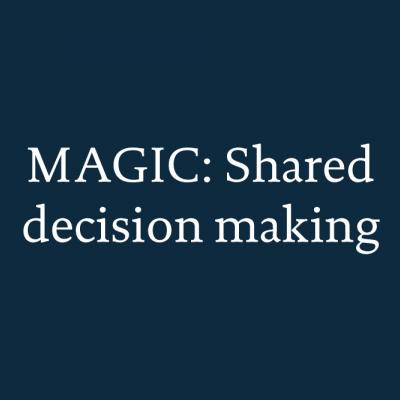Methods for changing clinician behaviour
This case study was provided by Newcastle upon Tyne NHS Foundation Trust and discusses its project to find additional ways of reminding clinicians about shared decision making and encouraging more of ...

Our MAGIC programme worked with frontline health professionals and their priority projects to test how to embed best practice in shared decision making and overcome the barriers to change. From the work MAGIC is doing, we discovered that positive things happen when clinicians and patients work together to make decisions, and along the way we saw attitudes and behaviours changing.
MAGIC has great potential for improving individuals’ health care experiences such as helping patients feel involved and listened to, and giving them a say in what happens to them. Getting patients engaged can bring added benefits. When patients are engaged and follow their treatment plans, their health outcomes improve and resources tend to be used more effectively. Some of the ways MAGIC has been helping patients include:
The teams used a range of approaches to tell patients and staff about the benefits of shared decision making, including:
This case study was provided by Newcastle upon Tyne NHS Foundation Trust and discusses its project to find additional ways of reminding clinicians about shared decision making and encouraging more of ...
This case study was provided by Newcastle upon Tyne NHS Foundation Trust about their project to help patients with enlarged prostate understand their condition and the types of treatment available.
This case study was provided by Newcastle upon Tyne NHS Foundation Trust and discusses the project was run by the Newcastle obstetrics team, focusing on women considering vaginal birth after a previou...
A project carried out by the breast care team in Cardiff, measuring patient involvement in shared decision making in breast care.
This case study was provided by Cardiff and Vale University Health Board and discusses how action learning sets were built in to the MAGIC programme to facilitate collaboration with primary care teams...
This project was run by Cardiff and Vale University Health Board and set out to enable patients to take part in active decision making through the use of decision support tools. They agreed priority a...
This case study was supplied by Newcastle upon Tyne NHS Foundation Trust and is an example of shared decision making from the Newcastle breast care team. The aim of the intervention was to help a pati...
We look for talented and passionate individuals as everyone at the Health Foundation has an important role to play.
View current vacanciesQ is an initiative connecting people with improvement expertise across the UK.
Find out more